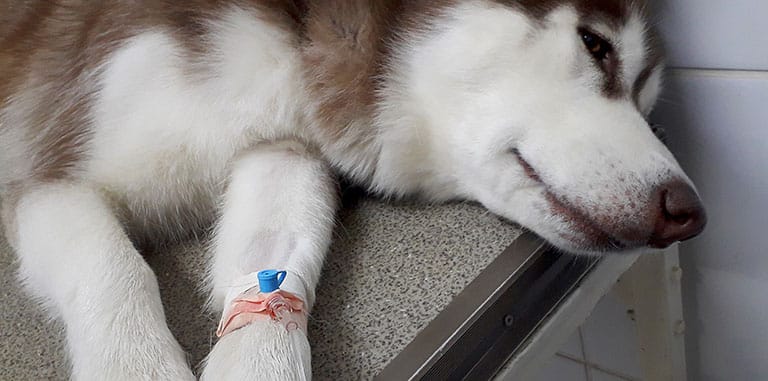Approximately 7%-14% of dogs and 30% of cats are diagnosed with lymphoma each year. This disease causes tumors and other symptoms to occur within the pet’s body. Though there is no cure, knowing the signs and getting an early diagnosis can help a pet reach remission for a time.
Read this blog to learn what lymphoma and what causes the disease. We’ll cover the types and symptoms of different types of lymphoma cats and dogs can develop, treatments and if it can be prevented.
What is Lymphoma and What Causes It?
Lymphoma is a cancer that comes from white blood cells called lymphocytes. These cells work as part of the immune system to fight against infections. The cancer can affect the whole or parts of the lymphatic system which includes the lymph nodes, lymphatic organs and lymphatic vessels.
The cause of this disease in dogs is unknown. Different components such as viruses, bacteria, strong magnetic fields and chemical exposure are all suspected to have an influence in lymphoma development but nothing has been proven.
The viruses FeLV and FIV often cause lymphoma in cats. These viral infections cause feline leukemia which then develops into lymphoma. Tobacco smoke also has an effect on whether or not a cat is at high risk for the cancer. Studies have found that felines exposed to tobacco smoke are two times more likely to develop lymphoma.
Types and Symptoms of Lymphoma in Cats

Intestinal Lymphoma
Cats can develop one of three types of feline lymphoma. Intestinal lymphoma is the most common with 50%-70% of the diagnosed cases. The average age of diagnosis is 9-13 years old as senior felines are most susceptible to developing this kind of cancer. Signs a cat has developed intestinal lymphoma are vomiting, weight loss, diarrhea, lethargy, appetite changes and a growth in the abdomen.
Mediastinal Lymphoma
Mediastinal lymphoma affects the lymph nodes or the thymus in the chest. A cat may have trouble breathing as the cancer mass affects the ability to properly inflate their lungs. This type of lymphoma is strongly connected to feline leukemia with 80% of affected felines testing positive. This cancer appears mostly in younger cats with the average age being 5 years old.
Renal Lymphoma
Renal lymphoma attacks the kidneys and causes kidney failure. Other symptoms include vomiting and weight loss. The cells in the organ are replaced by cancer cells and the result is kidney failure. Around 50% of cases of lymphoma are connected to feline leukemia.
Types and Symptoms of Lymphoma in Dogs

Extranodal Lymphoma
There are four types of canine lymphoma that can develop in dogs. Extranodal lymphoma is the rarest as it does not attack the lymphatic system but instead the organs outside of it. Other organs that can be affected are the eyes, kidneys or lungs. Growths and lumps appear on the lymph nodes in these places. The most common type of extranodal lymphoma is cutaneous lymphoma which affects the skin and appears as a scaly area on the body.
Alimentary Lymphoma
Alimentary lymphoma attacks the gastrointestinal tract. The tumor(s) can show up in the stomach, small intestine, large intestine and/or rectum. This type of lymphoma affects dogs of any age. The signs that a canine has alimentary lymphoma are belly pain, anorexia, weight loss, diarrhea and vomiting.
Mediastinal Lymphoma
The chest is affected with mediastinal lymphoma and is uncommon among canines. Progressed mediastinal lymphoma can also attack the lungs of the dog and makes it hard for them to breathe because of the large lump forming or fluid buildup. Certain parts of the dog’s body may get swollen like their face and front legs. They may also desire to drink more and go to the bathroom more consistently.
Multicentric Lymphoma
This is the most common type of lymphoma in dogs. The lymph nodes throughout the canine’s body are affected as they become enlarged very quickly. Multicentric lymphoma accounts for approximately 80%-85% of diagnosed cases in dogs.
Treatments of Lymphoma
Chemotherapy is the main treatment for all types of lymphoma for cats and dogs. This is seen as the most effective way to combat the cancer. For example, 70%-90% of dogs with multicentric lymphoma reached complete or partial remission with chemotherapy. Treatment is administered through an IV, by mouth or a combination of both. In rare cases surgery is done to remove the cancer cells from the infected part of the pet’s body.
A cat or dog can go into remission, however it is usually just a partial remission. The cancer cells shrink and remain dormant for anywhere between six months to three years depending on the type and severity of the cancer. Lymphoma usually comes back and is more difficult to treat the second time. If a dog has a lymphoma recurrence, it is usually fatal.

Prevention of Lymphoma
There are no known preventative measures to protect dogs from lymphoma as the cause for this cancer is unknown.
Cats should be kept away from tobacco smoke, as separation helps to reduce their chances of developing lymphoma. It’s best not to smoke indoors where felines are present.
Vaccinations for FeLV help to significantly reduce the risk of lymphoma in cats. The FeLV vaccination is seen as a core shot for kittens and outdoor cats. Learn about the importance of vaccines for your pets here.

The Big C
All forms of cancer are scary. Knowledge and understanding helps to take away some of that fear. Though dog owners are not able to take steps to prevent lymphoma, they can notice the signs and take their canine in to get an early diagnosis. Cat owners are encouraged to take the FeLV vaccine seriously and get their kittens and outdoor cats vaccinated along with keeping tobacco smoke away from them. Even with these steps, a cat may still develop one of the types of lymphoma.
Chemotherapy is hard, but may be necessary to fight the cancer cells building in the pet’s body. This treatment gives the cat or dog a much higher chance at complete or partial remission and is often able to extend their life a while longer.




